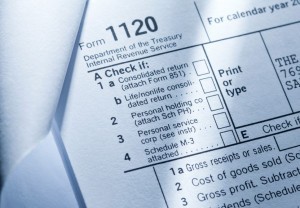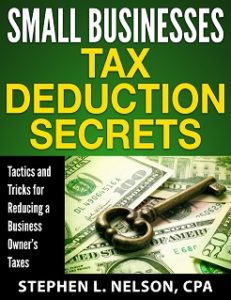
I had a couple of people challenge me this tax season on our pricing.
One guy called on the telephone asking if we’re actually serious that our minimum price equals $500. (We are.)
Another person, after getting a quote from me of over a thousand dollars, just shook his head and said he couldn’t understand why a tax return didn’t cost something more along the lines of $150.
I’ve pondered all this off and on over the weeks since these comments. And the more I ponder, the more these two taxpayers seem right. Somebody absolutely should be able to get a great tax return prepared for a decent price. A price far less than what firms like ours charge.
After brainstorming about this quite a bit, therefore, I’ve got three tips for people who want a high quality tax return prepared for less than $100.
You can, I truly believe, get such a tax return if you follow three simple tips…
Tip #1: Simplify Your Finances
Most of the cost of preparing a tax return flows either directly or indirectly from the complexity of the taxpayer’s finances.
Accordingly, your first step to reduce tax return preparation costs is simplification. You want to strip all the complicated stuff from your return.
For example, you must eliminate any foreign investments. These easily produce complexities related to foreign tax credits. And these foreign investments may (if your account balances grow) trigger requirements for massive amounts of complicated, risky disclosures. Yikes.
Similarly, you should avoid any investments that mean you need to allocate your income among multiple states. For example, don’t invest in out of state real estate. And, for goodness sake, don’t become a co-owner in an S corporation or partnership that operates across state lines.
Filing tax returns in multiple jurisdictions represents a sure way to jack the costs of return preparation. You don’t get to go international or multistate and keep your costs low. No way.
But filing a stack of tax returns isn’t the only way that people complicate their tax returns and then jack up the expense of preparation. Becoming an active investor who owns or operates sideline businesses or investments (including rental properties) jacks the complexity and costs of a return. So does trading shares of stock and mutual funds.
You also want to avoid all these complications. Seriously.
If you keep your income sources simple and straight forward enough that they can be reported on a W-2 or on a 1099 statement from a mutual fund company like Vanguard or Fidelity, you make your tax return a walk in the park. And easy means cheap.
Note: If you want to trade mutual funds or stocks and you do so inside of a retirement account, you won’t create complexity for your tax return. I am not saying, by the way, that it’s a good idea to actively invest and attempt to trade stocks. In my opinion, you ought to use a passive approach based on a handful of low-cost index funds. I’m just saying if you are going to, for example, day trade; don’t create a situation where you need to report this activity on your tax return if you’re interested in keeping your tax return preparation costs low.
Tip #2: Do Out-of-tax-season Tax Planning
Okay, so here’s another tip: I think if you’re trying to save costs that you may as well do your own tax planning.
Good tax planning gets too expensive–especially if you’re dealing with complicated tax returns.
But if you simplify your situation, you can pretty easily do your own planning. And here’s how I’d go about that: Sometime mid-year, get one of the popular tax preparation guides and read through it.
You can skim the parts that deal with the complicated stuff you’re dropping out of. But do closely read all the other stuff.
I bet you can do your skimming and reading in less than a couple of hours. For sure less than four hours.
The big tax planning gambits available to regular folk, for example, revolve around retirement account choices like Individual Retirement Accounts and 401(k) options and around tax credits and deductions for education and children. So really dig into these topics.
A caution: You’re not with a do-it-yourself approach trying to identify some complicated strategy that might work or some gambit that’s safe but requires a bunch of accounting. Rather, you simply want to make sure you aren’t missing some big tax savings gambit that’ll save you several hundred or several thousand dollars a year.
By the way, I have a couple of short tax planning ebooks for small business owners and real estate investors. But if you’re really trying to grind down your tax return preparation costs, you probably won’t have a business or real estate. (That makes sense, right? You’re looking for ways to keep your stuff really simple.) So I’m not thinking that super-cost-conscious people buy and read those titles.
I’m suggesting something more along the lines of the J.K. Lasser or the Ernst & Young tax guide. You can purchase these books and pay around $20 (including shipping and sales tax.)
Tip #3: Use TurboTax or TaxCut
Here’s my last tip… Don’t go to some paid preparer for a return. Do it yourself.
In other words, go out and buy a copy of a TurboTax or H&R Block Tax Cut.
For $30 to $50, you’ll be able to download good software you can use to easily do a simplified tax return. I bet the process will only take an hour or two. Even if you’re not really a computer person.
Yes, you’ll have to deal with Schedule A’s itemized deductions stuff on your own. But if you’ve kept your finances simple in all other ways, the itemized deductions stuff will be easy.
Let me point out here that if you have simplified your finances to the point where you can do your own planning using a $20-ish book like J.K. Lasser’s annual tax guide and to the point where you can do your own preparation using $40 software like TurboTax, you should easily be able to spend less than $100. Even after accounting for any other nickel-and-dime items like paper, postage and paperclips.
Furthermore, you may not have much more than half a Saturday’s work.
Are You a Small Business Owner Looking to Save Taxes?
 This is sort of off-topic, but earlier in the post I mentioned a couple of e-books. In case you’re interested, I’ll mention that the e-book most applicable to readers of this blog is for small business owners looking to grind down their income and self-employment tax burden, Small Businesses Tax Deduction Secrets. (The other e-book is about real estate investment tax planning.)
This is sort of off-topic, but earlier in the post I mentioned a couple of e-books. In case you’re interested, I’ll mention that the e-book most applicable to readers of this blog is for small business owners looking to grind down their income and self-employment tax burden, Small Businesses Tax Deduction Secrets. (The other e-book is about real estate investment tax planning.)
Here’s why I mention this: You may be able to save a bundle on your income and payroll taxes by getting strategic about maximizing your business tax deductions. And if you are going to try and do this, you may want to consider our $40 e-book.
This instantly downloadable e-book, which of course comes with a money-back guarantee, provides detailed instructions about how business owners can annually save thousands or even tens of thousands of dollars in income and related taxes simply by more effectively using legitimate small business tax deductions.
Interested? Click here for more detailed information.
Tip: Clients of our CPA firm don’t need to purchase this e-book–or any of our other e-books. They can email us and ask for a complimentary copy.
Instantly Downloadable & Money Back Guarantee
The book as noted is instantly downloadable. You get the e-book when you purchase it. (We also send you an email after your purchase with a link you can also use to download the e-book pdf.)
By the way, we provide a money-back guarantee. If you don’t information you need or want, no problem. Just email us and request your refund.